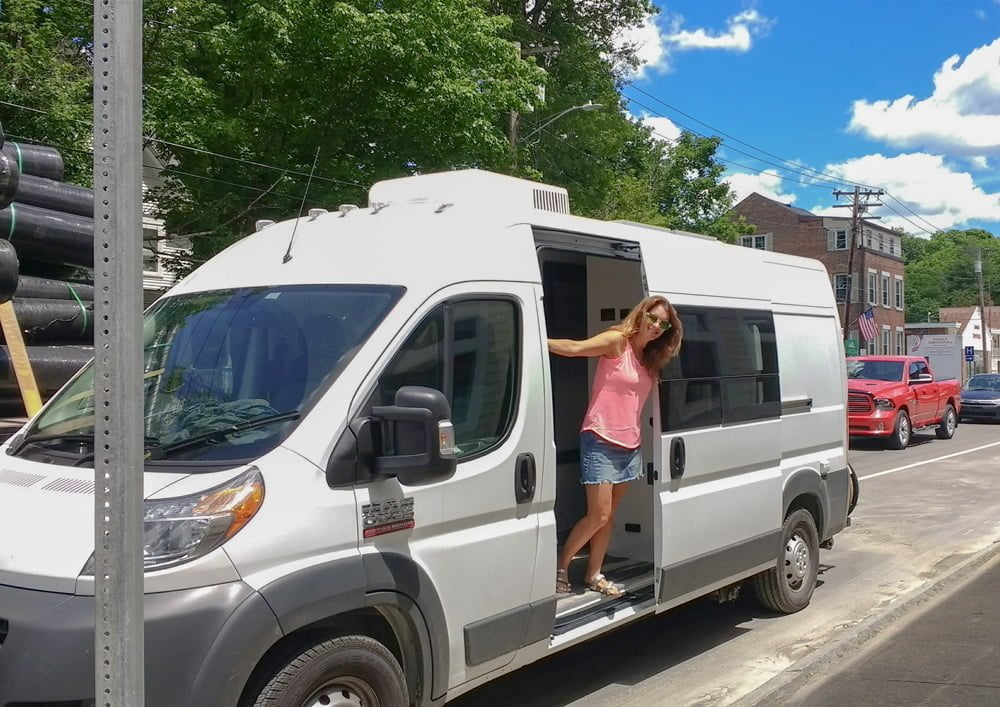Vanlife is the best way to travel. Granted, I’m perhaps the most biased person on the planet to blog on this topic, but I’m all-in on vanlife! With that out of the way, keep in mind that I’m still all-in after owning 7 camper vans ranging from a 1971 VW Westfalia to 4x DIY builds, over the course of the last 31 years which is my entire adult life! In this blog post I’ll give you some of the reasons why.
Agility = Options
The agility of a camper van is a game-changer compared to staying at hotels or even a larger RV.
RVs, with their bulky size, limit where you can go… narrow mountain roads, tight parking lots, and urban areas are often off-limits. Compare that to a camper van which is typically the same size as a large SUV or truck. This means you don’t have to worry about where you’re going to go. With an RV you’d better consider how you’re going to park or turn around. With a van, you navigate the way you’re used to in a car.
On the camping side of things camper vans can overnight just about anywhere it’s allowed – from trailheads to urban parking lots to hidden gems you can find on apps like iOverlander. Obviously, the size of a full-size RV makes this considerably harder. per van, being closer in size to a regular vehicle, opens up a world of options. This frees up time in your travel days to explore instead of trying to find camping sites and typically opens up options closer to where you want to be.
Hotels Suck
In general and the friction of staying in hotels is more apparent after you experience the agility detailed above. In addition to all that you have to pack stuff in and out of the room. In a van everything you’re used to having is where you left it! Compare that to the logistical headaches you face when staying in hotels. You forgot to pack some things, you leave others in your car or Uber and, ultimately, you forget stuff in the room when you check out. Then there’s the fact that “hotel life” revolves around the hotel’s schedule instead of yours – from check in time to when they wake you up in the morning with their vacuums to when the “food product they describe as breakfast” is available in the lobby. You also have to go through all the rigamarole and cost to book the room – normally well in advance. Then there is the general comfort which is generally lacking. Even when the bed is comfortable and the room is pretty nice, everything is different for every stay in every town. Just imagine having your very own bedroom and bathroom following you around wherever you go and then waking up and being able to make your own morning beverage and a proper breakfast. So. Much. Better.
Always Ready To Roll
Speaking of packing and logistics, one of the things I love about van travel is that most of the stuff you want is already in the van, ready to roll. I always say that it takes the same amount of time to prepare for a two-day trip as it does for a two-month trip. I keep my van stocked so that all I need to do is add some food and some clothes to hit the road.
Self-Sufficiency & Types of Camper Vans
Camper vans, particularly the “adventure van” types, really shine when it comes to self-sufficiency and being off grid (a.k.a: boondocking). What do I mean by “adventure type”? The way I think about camper vans is that they fall into two broad categories: what the industry calls “Class-B RVs” or the so-called “adventure vans”. Class-B RVs are similar to their larger RV cousins in the way they’re mass-produced by companies like Winnebago and Thor and share many of the systems of a typical RV. Compared to adventure vans, the B’s tend to have smaller water tanks and primitive electrical systems, etc. So, the first big difference is their ability to be off-grid for longer periods of time. Adventure vans also tend to offer a more rugged style and durable surfaces that can stand up to the grit of a more adventurous lifestyle as well as spaces for “gear” like bikes which is often in the form of what people refer to as a “garage” under the sleeping area normally near the rear cargo doors. So, while all camper vans are agile, “adventure vans” are even more so!
To illustrate this, following images compare the style and systems of a Thor Scope (Class-B, on the left side of photos) and a Remote Vans “Friday” series
(adventure van, on the right side of photos). You can click on the images to make them bigger. Ultimately, style is subjective but if you look a the systems they are objectively better. The Thor has a 1000 watt inverter and the 200 watts of solar for charging which is the only way to charge without turning on your generator or plugging into shore power. I found that it only has 18 gallons of fresh water on board in a Google search. Meanwhile, the Remote Vans has a state-of-the art Lithionics electrical system with a 3000 watt inverter and a secondary alternator that can charge the batteries at 100 amps at 48V (over 5000 watts) anytime you’re driving. It also has twice as much fresh water capacity at 32 gallons!
Also notable, adventure vans are more expensive! This is one of the many reasons most of our customers are making their own adventure-style vans which we make much easier with our blog, videos and extensive catalog of the very best, road-tested camper van build products. But, you can also hire a van builder in your area or purchase one that is manufactured by a company like Remote Vans with the ability to finance it.
A well-built van is ready to travel just about anywhere without the need for “hookups” (water or electrical connections, etc.). You can drive it where you want to be and live comfortably using its gasoline heater, energy-efficient DC air conditioner, large water supply and nearly limitless electrical power and luxurious hot water. So, literally by driving, you’re generating electricity and hot water. At the end of a travel day, instead of needing a campground or RV park with hookups for life-support, you can overnight anywhere it makes sense – from a Walmart parking lot to a remote campsite – all you need is fuel (gas or diesel) and a place you want to drive.
I’m about a week into a van adventure and I haven’t needed hookups at all. I will eventually need to refill my water tank and the “cassette” to my toilet (as fun and glamorous as you’re imagining) but I can normally find ways to do that for free (or low cost) at rest stops or other similar places. Meanwhile, I’ve been running my AC when it’s hot, heater when it’s cool, Starlink internet continuously and enjoying “me espresso” every morning. The only “inputs” have been lots of gasoline and perhaps some donuts.
Honestly, I think most people really want an adventure van but don’t know about this distinction when they start shopping for their rig. Many of our customers have ended up with a B-van only to rip out its disabled electrical system and replace it with a truly capable one from Victron.
Fuel Efficiency Is Way Better
This one is so obvious but worth mentioning… Fuel efficiency is one of a camper van’s biggest wins over an RV. While RVs guzzle gas with their massive engines and size – sometimes getting as low as 6-10 miles per gallon. Meanwhile a camper van sips fuel more like a big car, often averaging 15-20 MPG depending on the model and fuel type (gasoline or diesel). This not only saves money at the pump but also reduces the environmental footprint of your travels and how often you’re stopping for fuel.
Easy to Store When Not Using
When the trip’s over, a camper van is a breeze to store compared to an RV. An RV requires a dedicated parking spot, often at a premium cost, or a storage facility with monthly fees. A van can often slide into your garage, driveway, or even a regular parking space. Its compact size means you’re not wrestling with logistics or shelling out extra cash when it’s not in use. Also in some cases municipal or HOA restrictions against RVs don’t apply to camper vans.
Community
This one is less intuitive but I would say that one of the best things about vanlife is the community! The camper van lifestyle draws a diverse group of like-minded people who value adventure, freedom and friendship.
I’ve talked with so many people who had dozens of different reasons to get into vanlife – from full-time travel to working remotely – but one of the common threads is that once they started, what has kept them going – especially during difficult moments – is the awesome community.
You’ll meet folks on the road, at campsites and, notably at community-focused vanlife gatherings spread around the country such as Peace Love & Vans. Check out our event calendar for ideas on other gatherings.
Despite the wide range of people and reasons for being on the road, we all have one important thing in common – we’re crazy (or smart) enough to travel and live in a tiny house on wheels. Vanlifers share a bond over the thrill of the open road and a mutual appreciation for experiences over stuff. It’s a true community that you’ll probably find welcoming as well as inspiring.
Below is a fun photo from the 2025 Peace Love & Vans at the moment someone is winning a raffle prize 🙂
Forced Minimalism
Living in a camper van forces you into a practical form of minimalism in the best way possible. With extremely limited space, you must really think about what’s essential and what’s clutter. Which clothes, tools, cookware and other essentials do you absolutely need? Are there things you can pack that do double duty? And, when you go to the grocery store or farmer’s market, you’ll typically only be buying for a day or two. Best of all, once you’ve gone through this process and lived with the bare essentials most people tend to carry that forward to their stationary life. It’s liberating to discover how much joy fits into such a small footprint.
Get Out!
The cozy-but-minimal quarters of a camper van naturally push you outdoors. One common question people ask about my van is something along the lines of “this is really cool but don’t you feel cooped up?” My answer is no! The van has all the necessary comforts like a bed, galley, bathroom, etc. but I don’t want to drive around the country or the world to be inside ANY type of structure. The whole point of travel and or being in nature is to be OUT there – on the trail, at the beach, in the city, etc. A big living space is actually something of a temptation to stay inside rather than getting out there. It’s a feature, not a bug 🙂
Can Use a Van as a Daily Driver
A camper van doubles as a daily driver, which is a huge perk over an RV. RVs are too big for errands or commutes, racking up extra costs for storage, insurance, and often a second vehicle. With a van, you can commute, get the groceries just as easily as any other car.
What Are You Waiting For?
That wraps it up! What am I missing? Are there even more benefits to traveling in a van? If so, let us know (orders@vanlifeoutfitters.com).
If you haven’t taken the plunge yet, what are you waiting for? As you know, life is short, and if you’ve read this far, you are probably pretty interested in unique blend of novelty, challenge and comfort that vanlife offers, so you might as well try! I would recommend renting (or borrowing) a van and seeing what you think. Also, try to find a vanlife event near you so you can experience the community as well. See you out there!
“You only live once, but if you do it right, once is enough.”
– Mae West




